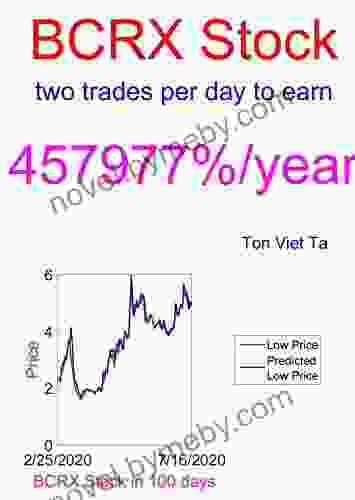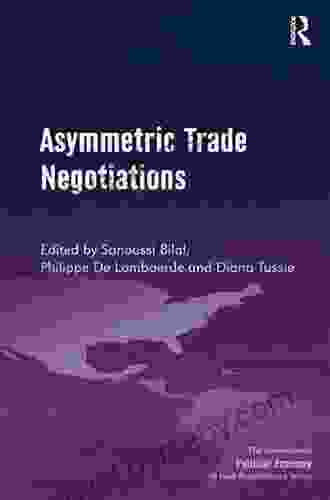Asymmetric Trade Negotiations: The International Political Economy of New Trade Agreements

4.4 out of 5
| Language | : | English |
| File size | : | 3440 KB |
| Text-to-Speech | : | Enabled |
| Screen Reader | : | Supported |
| Enhanced typesetting | : | Enabled |
| Word Wise | : | Enabled |
| Print length | : | 222 pages |
In the ever-evolving landscape of global trade, asymmetric trade negotiations have emerged as a significant force shaping the dynamics of international economic relations. These negotiations, characterized by a stark power imbalance between participating countries, have profound implications for the global political economy, influencing trade patterns, economic development, and international cooperation.
Understanding Asymmetric Trade Negotiations
Asymmetric trade negotiations occur when countries with significantly different levels of economic power engage in negotiations to establish trade agreements. This power imbalance can stem from factors such as economic size, technological advancement, or political influence. The dominant party in such negotiations typically holds a bargaining advantage, enabling them to exert greater influence over the terms of the agreement.
The consequences of asymmetric trade negotiations can be far-reaching. For weaker countries, these negotiations may result in trade agreements that favor the interests of the dominant party. This can lead to the erosion of domestic industries, job losses, and economic dependency. On the other hand, for stronger countries, asymmetric trade negotiations can provide opportunities to expand market access, secure favorable trade terms, and strengthen their economic position.
The Political Economy of Asymmetric Trade Negotiations
The political economy of asymmetric trade negotiations is complex, involving a multitude of factors that influence the outcomes of these negotiations. These factors include:
- Economic Interests: Countries engage in trade negotiations primarily to advance their economic interests. For weaker countries, this may involve securing access to new markets, attracting foreign investment, or diversifying their economies. For stronger countries, the focus may be on expanding exports, gaining access to raw materials, or strengthening their economic dominance.
- Political Power: The relative political power of negotiating parties plays a crucial role in shaping the outcomes of asymmetric trade negotiations. Stronger countries often wield greater political influence, enabling them to pressure weaker countries to accept less favorable terms.
- Institutional Context: The institutional context within which trade negotiations take place can also influence their outcomes. International organizations such as the World Trade Organization (WTO) provide a framework for negotiations and establish rules governing trade relations. However, these institutions may not always effectively address the concerns of weaker countries.
Impacts of Asymmetric Trade Negotiations
Asymmetric trade negotiations have a wide range of impacts on the international political economy, including:
- Trade Patterns: Trade agreements resulting from asymmetric negotiations can significantly alter trade patterns, leading to increased trade between the negotiating parties and potentially diverting trade away from other countries.
- Economic Development: For weaker countries, asymmetric trade negotiations may hinder economic development by limiting their ability to protect domestic industries and promote sustainable growth.
- International Cooperation: Asymmetric trade negotiations can undermine international cooperation by creating tensions and mistrust between negotiating parties. Weaker countries may feel exploited or coerced, leading to resentment and a reluctance to engage in future negotiations.
Addressing the Challenges of Asymmetric Trade Negotiations
Recognizing the challenges posed by asymmetric trade negotiations, there is a need for concerted efforts to address these issues and ensure that trade agreements are fair and equitable. Some potential approaches include:
- Strengthening International Institutions: International organizations such as the WTO need to be strengthened to provide a more balanced and equitable framework for trade negotiations. This involves ensuring that the rules and procedures established by these organizations are fair and transparent and that weaker countries have a meaningful voice in decision-making.
- Capacity Building: Weaker countries should be provided with capacity-building assistance to enhance their negotiating skills and enable them to participate more effectively in trade negotiations. This can involve training in areas such as trade policy analysis, negotiation techniques, and the use of legal instruments.
- Regional Cooperation: Weaker countries can form regional alliances or partnerships to strengthen their bargaining power in trade negotiations. By coordinating their positions and presenting a united front, these countries can better protect their interests and achieve more favorable outcomes.
Asymmetric trade negotiations are a complex and challenging aspect of the international political economy. Understanding the dynamics of these negotiations and their implications is essential for policymakers, scholars, and anyone interested in the shaping of global economic relations. By addressing the challenges posed by asymmetric trade negotiations, we can work towards creating a more just and equitable international trading system that benefits all countries.
4.4 out of 5
| Language | : | English |
| File size | : | 3440 KB |
| Text-to-Speech | : | Enabled |
| Screen Reader | : | Supported |
| Enhanced typesetting | : | Enabled |
| Word Wise | : | Enabled |
| Print length | : | 222 pages |
Do you want to contribute by writing guest posts on this blog?
Please contact us and send us a resume of previous articles that you have written.
 Book
Book Novel
Novel Page
Page Chapter
Chapter Text
Text Story
Story Genre
Genre Reader
Reader Library
Library Paperback
Paperback E-book
E-book Magazine
Magazine Newspaper
Newspaper Paragraph
Paragraph Sentence
Sentence Bookmark
Bookmark Shelf
Shelf Glossary
Glossary Bibliography
Bibliography Foreword
Foreword Preface
Preface Synopsis
Synopsis Annotation
Annotation Footnote
Footnote Manuscript
Manuscript Scroll
Scroll Codex
Codex Tome
Tome Bestseller
Bestseller Classics
Classics Library card
Library card Narrative
Narrative Biography
Biography Autobiography
Autobiography Memoir
Memoir Reference
Reference Encyclopedia
Encyclopedia Rowland B Wilson
Rowland B Wilson Jem Milton
Jem Milton Rockwell Kent
Rockwell Kent Ruby Hamad
Ruby Hamad Rochelle Alers
Rochelle Alers Seth Davis
Seth Davis Sarah Hazell
Sarah Hazell Quinn Loftis
Quinn Loftis Tony Silvia
Tony Silvia Tim Maudlin
Tim Maudlin Steven D Garber
Steven D Garber Timothy Garton Ash
Timothy Garton Ash Lev Golinkin
Lev Golinkin Roderick Beaton
Roderick Beaton Roger H Davies
Roger H Davies Raymond H Thompson
Raymond H Thompson Rich Buckler
Rich Buckler Sharon C Cooper
Sharon C Cooper Robert Silverberg
Robert Silverberg Rick Clark
Rick Clark
Light bulbAdvertise smarter! Our strategic ad space ensures maximum exposure. Reserve your spot today!

 Timothy WardPrice Forecasting Models for BioCryst Pharmaceuticals Inc. (BCRX) Stock on...
Timothy WardPrice Forecasting Models for BioCryst Pharmaceuticals Inc. (BCRX) Stock on... Donald WardFollow ·16.6k
Donald WardFollow ·16.6k Harold BlairFollow ·19.1k
Harold BlairFollow ·19.1k E.M. ForsterFollow ·9.3k
E.M. ForsterFollow ·9.3k Edgar HayesFollow ·15k
Edgar HayesFollow ·15k Lord ByronFollow ·18.9k
Lord ByronFollow ·18.9k Xavier BellFollow ·5.2k
Xavier BellFollow ·5.2k Larry ReedFollow ·16.1k
Larry ReedFollow ·16.1k Ralph EllisonFollow ·7.8k
Ralph EllisonFollow ·7.8k

 Mike Hayes
Mike HayesArthur Meighen: A Life in Politics
Arthur Meighen was one of Canada's most...

 Bryan Gray
Bryan GrayVindicated: Atlanta's Finest
In the heart of Atlanta, a...

 Houston Powell
Houston PowellHis to Defend: A Captivating Legal Thriller That Will...
An Unforgettable...

 John Green
John GreenUncover the Riveting Tale of "Hunted: Atlanta Finest" - A...
Prepare yourself for a...
4.4 out of 5
| Language | : | English |
| File size | : | 3440 KB |
| Text-to-Speech | : | Enabled |
| Screen Reader | : | Supported |
| Enhanced typesetting | : | Enabled |
| Word Wise | : | Enabled |
| Print length | : | 222 pages |














